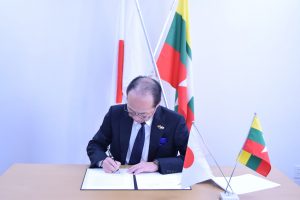In the aftermath of the coup d’etat at the beginning of February, Japan’s unique relationship with the Tatmadaw led to high expectations from people inside and outside Myanmar. Japan was viewed as an important negotiator that might be able to break the situation and turn the military around. However, more than a month later, there have been no notable results. Instead, Japan has become a source of great anger among the people of Myanmar.
When Japanese people talk about Myanmar, the term “pro-Japanese” is often used. This is due partly to the legacy of the late General Aung San and his daughter, National League for Democracy (NLD) leader Aung San Suu Kyi, both of whom spent time in Japan. This perception also reflects the recent strength of economic ties, and the personal experience of many Japanese that the sentiment of the people of Myanmar is generally more favorable to Japan than China, which is a strong rival for investment in Myanmar.
The Japanese government also refers to its “historically friendly relations” with Myanmar. Japan’s most recent Diplomatic Bluebook holds that “the stability of Myanmar, which has a historical friendship with Japan, has huge potential for economic development, and geopolitical importance is directly related to stability and prosperity throughout the entire region.”
In the past, the Japanese government has taken a more favorable stance toward the Myanmar government and military than Western countries. Even before the 2000s, when the United States and other countries imposed economic sanctions on Myanmar, Japan did not follow suit. While Western countries have been withdrawing capital and intensifying criticism of Aung San Suu Kyi due to the Rohingya issue in recent years, Japan has taken a pragmatic stance in seeking an early solution to the problem through large-scale grant aid.
However, with the recent coup, Japan appears undecided about its stance. It is undeniable that the Japanese government’s official statement criticizing the coup came too late compared to other countries. And while the leaders of the United States, Singapore, South Korea, and other countries have issued statements directly condemning the military, Prime Minister Suga Yoshihide has not opened his mouth, although the government is reportedly considering suspending new overseas development assistance.
Japan’s ambassador to Myanmar, Maruyama Ichiro, on the other hand, has become the focus of public attention. Fluent in Burmese and reportedly enjoying close personal ties to the military and Aung San Suu Kyi alike, he appeared before demonstrators gathered in front of the Japanese embassy, greeted them in Burmese, and promised to bring the people’s voice to Tokyo. The people of Myanmar are gradually beginning to distrust this ambiguous stance, however as many had higher expectations for Japan to find an effective approach to the Myanmar military.
Then, an event occurred that turned that distrust into anger. On March 8, the Embassy of Japan in Myanmar announced on its official website and on Facebook that Maruyama had met with junta officials in Naypyidaw, following up on a report by MRTV, a state-run broadcaster. However, the post, which was written in English, Japanese, and Burmese, identified the person the ambassador met with as “foreign minister.” This has led to an outcry from the people of Myanmar, asking whether Japan recognizes the junta as the official government. The Facebook post had received more than 7,700 comments by the evening of March 9.
Maruyama, who was known for having a deeper understanding of Myanmar and had been supported by the people of Myanmar, lost their trust with this incident.
Immediately after the incident, another announcement from the Japanese government caused even more anger. The Ministry of Foreign Affairs announced a $19 million emergency grant aid for Rohingya refugees. The announcement was met with condemnation from the people of Myanmar, who feared that the money would go to the national army.
Under the scheme, the aid will be provided to the region through international organizations such as the International Committee of the Red Cross, not through Myanmar’s junta, and it is clear that the Japanese government has taken this concern into account. However, given reports that Myanmar’s government agencies and the national army confiscated relief supplies sent from abroad in the 2008 Cyclone Nargis disaster relief effort, this concern is likely to remain unresolved.
From Japan’s point of view, this aid might be a statement that Tokyo intends to continue providing large-scale economic assistance without benefiting the national military. If so, Japan’s government would have expected a positive response. In this way, the Japanese government’s message to the people of Myanmar seems to have not only fallen short of what it was intended to do, but also become counterproductive.
This is due not only to poor public relations but also to the fact that the Japanese government has not been able to deliver a strong message of criticism compared to other countries. The United States and Australia have shown resolute responses to the Myanmar government, for instance.
It would be against Japan’s interests to further lose the trust of the people of Myanmar, who have always been considered to be pro-Japanese. Japan is now facing a new challenge in dealing with the coup: Will the Japanese government be able to regain the trust of the people of Myanmar?
Keiho Sasamori is a scholar researching innovation policy in Myanmar and Japan. He is interested in Myanmar’s higher education policy and science and technology policy, and through his research, he has a unique network of contacts in Myanmar with students, university faculty, locally-launched startups, and parliamentarians. He has also been involved in news reporting and translation for Japanese media including NHK (Japan Broadcasting Corporation) and Nikkei Business.

































